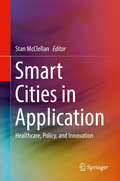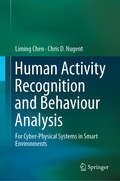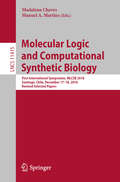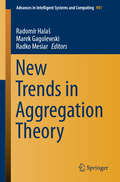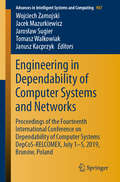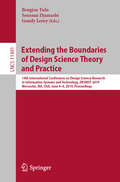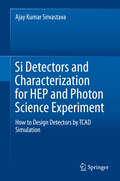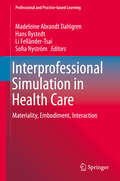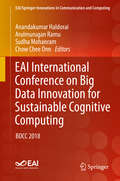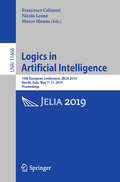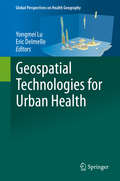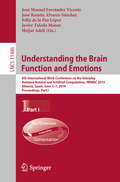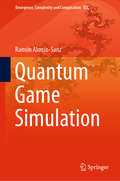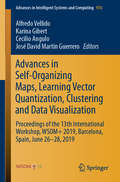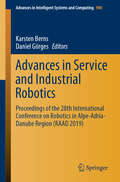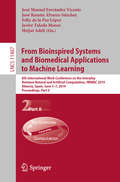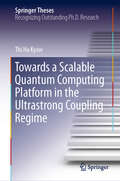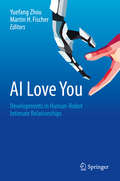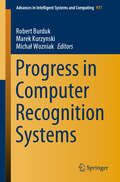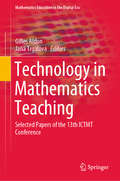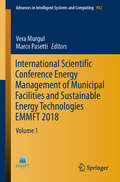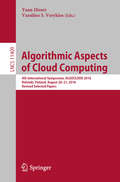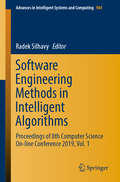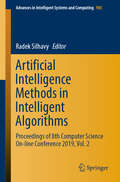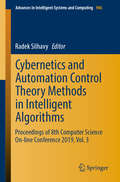- Table View
- List View
Smart Cities in Application: Healthcare, Policy, and Innovation
by Stan McClellanThis book explores categories of applications and driving factors surrounding the Smart City phenomenon. The contributing authors provide perspective on the Smart Cities, covering numerous applications and classes of applications. The book uses a top-down exploration of the driving factors in Smart Cities, by including focal areas including “Smart Healthcare,” “Public Safety & Policy Issues,” and “Science, Technology, & Innovation.” Contributors have direct and substantive experience with important aspects of Smart Cities and discuss issues with technologies & standards, roadblocks to implementation, innovations that create new opportunities, and other factors relevant to emerging Smart City infrastructures.Features an exploration of Smart City issues and solutions from a variety of stakeholders in the evolving fieldPresents conversational, nuanced, and forward thinking perspectives on Smart Cities, their implications, limitations, obstacles, and opportunitiesIncludes contributions from industry insiders who have direct, relevant experience with their respective subjects as well as positioning and corporate stature
Human Activity Recognition and Behaviour Analysis: For Cyber-Physical Systems in Smart Environments
by Liming Chen Chris D. NugentThe book first defines the problems, various concepts and notions related to activity recognition, and introduces the fundamental rationale and state-of-the-art methodologies and approaches. It then describes the use of artificial intelligence techniques and advanced knowledge technologies for the modelling and lifecycle analysis of human activities and behaviours based on real-time sensing observations from sensor networks and the Internet of Things. It also covers inference and decision-support methods and mechanisms, as well as personalization and adaptation techniques, which are required for emerging smart human-machine pervasive systems, such as self-management and assistive technologies in smart healthcare. Each chapter includes theoretical background, technological underpinnings and practical implementation, and step-by-step information on how to address and solve specific problems in topical areas.This monograph can be used as a textbook for postgraduate and PhD students on courses such as computer systems, pervasive computing, data analytics and digital health. It is also a valuable research reference resource for postdoctoral candidates and academics in relevant research and application domains, such as data analytics, smart cities, smart energy, and smart healthcare, to name but a few. Moreover, it offers smart technology and application developers practical insights into the use of activity recognition and behaviour analysis in state-of-the-art cyber-physical systems. Lastly, it provides healthcare solution developers and providers with information about the opportunities and possible innovative solutions for personalized healthcare and stratified medicine.
Molecular Logic and Computational Synthetic Biology: First International Symposium, MLCSB 2018, Santiago, Chile, December 17–18, 2018, Revised Selected Papers (Lecture Notes in Computer Science #11415)
by Madalena Chaves Manuel A. MartinsThis book collects the revised selected proceedings of the First International Symposium in Molecular Logic and Computational Synthetic Biology ( MLCSB), held in Chile, Santiago, in December 2018. The volume contains 7 full revised papers along with 2 surveys from 19 submissions presented at the symposium. One of the goals of the MLCSB 2018 was to explore the potential of molecular logic frameworks to study the emerging behavioural patterns in biological networks, combining discrete, continuous and stochastic features, and resorting both to specific or general-purpose analysis and verification techniques.
New Trends in Aggregation Theory (Advances in Intelligent Systems and Computing #981)
by Radomír Halaš Marek Gagolewski Radko MesiarThis book collects the contributions presented at AGOP 2019, the 10th International Summer School on Aggregation Operators, which took place in Olomouc (Czech Republic) in July 2019. It includes contributions on topics ranging from the theory and foundations of aggregation functions to their various applications. Aggregation functions have numerous applications, including, but not limited to, data fusion, statistics, image processing, and decision-making. They are usually defined as those functions that are monotone with respect to each input and that satisfy various natural boundary conditions. In particular settings, these conditions might be relaxed or otherwise customized according to the user’s needs. Noteworthy classes of aggregation functions include means, t-norms and t-conorms, uninorms and nullnorms, copulas and fuzzy integrals (e.g., the Choquet and Sugeno integrals). This book provides a valuable overview of recent research trends in this area.
Engineering in Dependability of Computer Systems and Networks: Proceedings of the Fourteenth International Conference on Dependability of Computer Systems DepCoS-RELCOMEX, July 1–5, 2019, Brunów, Poland (Advances in Intelligent Systems and Computing #987)
by Wojciech Zamojski Jacek Mazurkiewicz Jarosław Sugier Tomasz Walkowiak Janusz KacprzykThis book presents papers on various problems of dependability in computer systems and networks that were discussed at the 14th DepCoS-RELCOMEX conference, in Brunów, Poland, from 1st to 5th July 2019. Discussing new ideas, research results and developments in the design, implementation, maintenance and analysis of complex computer systems, it is of interest to researchers and practitioners who are dealing with dependability issues in such systems. Dependability analysis came as a response to new challenges in the evaluation of contemporary complex systems, which should be considered as systems of people – with their needs and behaviours –interacting with technical communication channels (such as mobile activities, iCloud, Internet of Everything) and online applications, often operating in hostile environments. The diversity of topics covered, illustrates the variety of methods used in this area, often with the help of the latest results in artificial and computational intelligence.
Extending the Boundaries of Design Science Theory and Practice: 14th International Conference on Design Science Research in Information Systems and Technology, DESRIST 2019, Worcester, MA, USA, June 4–6, 2019, Proceedings (Lecture Notes in Computer Science #11491)
by Bengisu Tulu Soussan Djamasbi Gondy LeroyThis book constitutes the thoroughly refereed proceedings of the 14th International Conference on Designing for a Digital and Globalized World, DESRIST 2019, held Worcester, MA, USA, June 2019. The 20 revised full papers included in the volume were carefully reviewed and selected from 54 submissions. They are organized in the following topical sections: Design Science Research Theory and Methodology; Design Science Research Applications in Healthcare; Design Science Research Applications in Data Science; and Design Science Research Applications in Emerging Topics.
Si Detectors and Characterization for HEP and Photon Science Experiment: How to Design Detectors by TCAD Simulation
by Ajay Kumar SrivastavaThis book reviews the HL-LHC experiments and the fourth-generation photon science experiments, discussing the latest radiation hardening techniques, optimization of device & process parameters using TCAD simulation tools, and the experimental characterization required to develop rad-hard Si detectors for x-ray induced surface damage and bulk damage by hadronic irradiation.Consisting of eleven chapters, it introduces various types of strip and pixel detector designs for the current upgrade, radiation, and dynamic range requirement of the experiments, and presents an overview of radiation detectors, especially Si detectors. It also describes the design of pixel detectors, experiments and characterization of Si detectors.The book is intended for researchers and master’s level students with an understanding of radiation detector physics. It provides a concept that uses TCAD simulation to optimize the electrical performance of the devices used in the harsh radiation environment of the colliders and at XFEL.
Interprofessional Simulation in Health Care: Materiality, Embodiment, Interaction (Professional and Practice-based Learning #26)
by Madeleine Abrandt Dahlgren Hans Rystedt Li Felländer-Tsai Sofia NyströmThis book describes and discusses a practice-oriented approach to understanding and researching interprofessional simulation-based education and simulation. It provides empirical findings from research on this topic and is informed by practice-oriented perspectives. It identifies critical features of the simulation practice and discusses how these can be used in reforming simulation pedagogy. The book is divided into three sections. Section 1 sets the scene for understanding the practices of interprofessional simulation-based education and simulation. It provides a theoretical and methodological framework for the conceptualisation of practices and for the empirical studies on which the book is based. Section 2 revisits the dimensions of the simulation process/exercise, i.e. the briefing, simulation, and debriefing, and provides empirical analyses of how the practice of simulation unfolds. Based on these analyses, section 3 identifies and discusses how pedagogies for simulation can be reformed to meet the demands of future healthcare and research.
EAI International Conference on Big Data Innovation for Sustainable Cognitive Computing: BDCC 2018 (EAI/Springer Innovations in Communication and Computing)
by Anandakumar Haldorai Arulmurugan Ramu Sudha Mohanram Chow Chee OnnThis proceeding features papers discussing big data innovation for sustainable cognitive computing. The papers feature detail on cognitive computing and its self-learning systems that use data mining, pattern recognition and natural language processing (NLP) to mirror the way the human brain works. This international conference focuses on cognitive computing technologies, from knowledge representation techniques and natural language processing algorithms to dynamic learning approaches. Topics covered include Data Science for Cognitive Analysis, Real-Time Ubiquitous Data Science, Platform for Privacy Preserving Data Science, and Internet-Based Cognitive Platform. The EAI International Conference on Big Data Innovation for Sustainable Cognitive Computing (BDCC 2018), took place on 13 – 15 December 2018 in Coimbatore, India.
Logics in Artificial Intelligence: 16th European Conference, JELIA 2019, Rende, Italy, May 7–11, 2019, Proceedings (Lecture Notes in Computer Science #11468)
by Francesco Calimeri Nicola Leone Marco MannaThis book constitutes the proceedings of the 16th European Conference on Logics in Artificial Intelligence, JELIA 2019, held in Rende, Italy, in May 2019. The 50 full papers and 10 short papers included in this volume were carefully reviewed and selected from 101 submissions. Additionally, the book contains 3 invited papers. The accepted papers span a number of areas within Logics in AI, including: belief revision and argumentation; causal, defeasible and inductive reasoning; conditional, probabilistic and propositional logic; description logics; logic programming; modal and default logic; and temporal logic.
Geospatial Technologies for Urban Health (Global Perspectives on Health Geography)
by Yongmei Lu Eric DelmelleThis volume presents a timely collection of research papers on the progress, opportunities, and challenges related to the advancement of geospatial technologies for applications in urban health research and management. The chapter authors cover technologies ranging from traditional GIS and remote sensing technologies, to recently developed tracking/locational technologies and volunteered geographic information (VGI). In four main sections, the book uniquely contributes to the conversation of how geospatial technologies and other GIScience research may be enhanced by addressing the data and challenges presented by urban health issues. The book is intended for those with backgrounds in health and medical geography, social epidemiology, urban planning, health management, and lifestyle research. The book starts with an introduction by the editors, providing an overview of traditional and emerging geospatial technologies and how they each can significantly contribute to urban health studies. Section 1 covers urban health risk and disease, and analyses the spatial and temporal patterns of selected urban health issues. Section 2 addresses urban health service access, and demonstrates how traditional and new geospatial technologies apply to different segments of urban populations facing varied challenges. Section 3 focuses on incorporating geospatial technologies in promoting healthy behaviours and lifestyles in urban settings. Section 4 assesses how geospatial technologies may be incorporated into urban health policies and management practices. Adopting a forward-looking perspective, these papers examine the various health challenges in urban systems, and explore how new and emerging geospatial technologies will need to develop to address these problems.
Understanding the Brain Function and Emotions: 8th International Work-Conference on the Interplay Between Natural and Artificial Computation, IWINAC 2019, Almería, Spain, June 3–7, 2019, Proceedings, Part I (Lecture Notes in Computer Science #11486)
by Hojjat Adeli José Manuel Ferrández Vicente José Ramón Álvarez-Sánchez Félix de la Paz López Javier Toledo MoreoThe two volume set LNCS 11486 and 11487 constitutes the proceedings of the International Work-Conference on the Interplay Between Natural and Artificial Computation, IWINAC 2019, held in Almería, Spain,, in June 2019. The total of 103 contributions was carefully reviewed and selected from 190 submissions during two rounds of reviewing and improvement. The papers are organized in two volumes, one on understanding the brain function and emotions, addressing topics such as new tools for analyzing neural data, or detection emotional states, or interfacing with physical systems. The second volume deals with bioinspired systems and biomedical applications to machine learning and contains papers related bioinspired programming strategies and all the contributions oriented to the computational solutions to engineering problems in different applications domains, as biomedical systems, or big data solutions.
Quantum Game Simulation (Emergence, Complexity and Computation #36)
by Ramon Alonso-SanzThis book addresses two disciplines that have traditionally occupied completely different realms: quantum information and computation, and game theory. Helping readers connect these fields, it appeals to a wide audience, including computer scientists, engineers, mathematicians, physicists, biologists or economists. The book is richly illustrated and basic concepts are accessible to readers with basic training in science. As such it is useful for undergraduate students as well as established academicians and researchers. Further, the didactic and tutorial-like style makes it ideal supplementary reading for courses on quantum information and computation, game theory, cellular automata and simulation.
Advances in Self-Organizing Maps, Learning Vector Quantization, Clustering and Data Visualization: Proceedings of the 13th International Workshop, WSOM+ 2019, Barcelona, Spain, June 26-28, 2019 (Advances in Intelligent Systems and Computing #976)
by Alfredo Vellido Karina Gibert Cecilio Angulo José David Martín GuerreroThis book gathers papers presented at the 13th International Workshop on Self-Organizing Maps, Learning Vector Quantization, Clustering and Data Visualization (WSOM+), which was held in Barcelona, Spain, from the 26th to the 28th of June 2019. Since being founded in 1997, the conference has showcased the state of the art in unsupervised machine learning methods related to the successful and widely used self-organizing map (SOM) method, and extending its scope to clustering and data visualization. In this installment of the AISC series, the reader will find theoretical research on SOM, LVQ and related methods, as well as numerous applications to problems in fields ranging from business and engineering to the life sciences. Given the scope of its coverage, the book will be of interest to machine learning researchers and practitioners in general and, more specifically, to those looking for the latest developments in unsupervised learning and data visualization.
Advances in Service and Industrial Robotics: Proceedings of the 28th International Conference on Robotics in Alpe-Adria-Danube Region (RAAD 2019) (Advances in Intelligent Systems and Computing #980)
by Karsten Berns Daniel GörgesThis book presents the proceedings of the 28th International Conference on Robotics in Alpe-Adria-Danube Region, RAAD 2019, held at the Fraunhofer Zentrum and the Technische Universität in Kaiserslautern, Germany, on 19–21 June 2019. The conference brought together academic researchers in robotics from 20 countries, mainly affiliated to the Alpe-Adria-Danube Region and covered all major areas of robotic research, development and innovation as well as new applications and current trends. Offering a comprehensive overview of the ongoing research in the field of robotics, the book is a source of information and inspiration for researchers wanting to improve their work and gather new ideas for future developments. It also provides researchers with an innovative and up-to-date perspective on the state of the art in this area.
From Bioinspired Systems and Biomedical Applications to Machine Learning: 8th International Work-Conference on the Interplay Between Natural and Artificial Computation, IWINAC 2019, Almería, Spain, June 3–7, 2019, Proceedings, Part II (Lecture Notes in Computer Science #11487)
by José Manuel Ferrández Vicente José Ramón Álvarez-Sánchez Félix de la Paz López Javier Toledo Moreo Hojjat AdeliThe two volume set LNCS 11486 and 11487 constitutes the proceedings of the International Work-Conference on the Interplay Between Natural and Artificial Computation, IWINAC 2019, held in Almería, Spain,, in June 2019. The total of 103 contributions was carefully reviewed and selected from 190 submissions during two rounds of reviewing and improvement. The papers are organized in two volumes, one on understanding the brain function and emotions, addressing topics such as new tools for analyzing neural data, or detection emotional states, or interfacing with physical systems. The second volume deals with bioinspired systems and biomedical applications to machine learning and contains papers related bioinspired programming strategies and all the contributions oriented to the computational solutions to engineering problems in different applications domains, as biomedical systems, or big data solutions.
Towards a Scalable Quantum Computing Platform in the Ultrastrong Coupling Regime (Springer Theses)
by Thi Ha KyawThis thesis devotes three introductory chapters to outlining basic recipes for constructing the quantum Hamiltonian of an arbitrary superconducting circuit, starting from classical circuit design. Since a superconducting circuit is one of the most promising platforms for realizing a practical quantum computer, anyone who is starting out in the field will benefit greatly from this introduction. The second focus of the introduction is the ultrastrong light-matter interaction (USC), where the latest developments are described. This is followed by three main research works comprising quantum memory in USC; scaling up the 1D circuit to a 2D lattice configuration; creation of Noisy Intermediate-Scale Quantum era quantum error correction codes and polariton-mediated qubit-qubit interaction. The research work detailed in this thesis will make a major contribution to the development of quantum random access memory, a prerequisite for various quantum machine learning algorithms and applications.
AI Love You: Developments in Human-Robot Intimate Relationships
by Martin H. Fischer Yuefang ZhouUsing an interdisciplinary approach, this book explores the emerging topics and rapid technological developments of robotics and artificial intelligence through the lens of the evolving role of sex robots, and how they should best be designed to serve human needs. An international panel of authors provides the most up-to-date, evidence-based empirical research on the potential sexual applications of artificial intelligence. Early chapters discuss the objections to sexual activity with robots while also providing a counterargument to each objection. Subsequent chapters present the implications of robot sex as well as the security and data privacy issues associated with sexual interactions with artificial intelligence. The book concludes with a chapter highlighting the importance of a scientific, multidisciplinary approach to the study of human - robot sexuality. Topics featured in this book include: The Sexual Interaction Illusion Model. The personal companion system, Harmony, designed by Realbotix™. An exposition of the challenges of personal data control and protection when dealing with artificial intelligence. The current and future technological possibilities of projecting three-dimensional holograms. Expert discussion notes from an international workshop on the topic. AI Love You will be of interest to academic researchers in psychology, robotics, ethics, medical science, sociology, gender studies as well as clinicians, policy makers, and the business sector.
Progress in Computer Recognition Systems (Advances in Intelligent Systems and Computing #977)
by Robert Burduk Marek Kurzynski Michał WozniakThis book highlights recent research on computer recognition systems, one of the most promising directions in artificial intelligence. Offering the most comprehensive study on this field to date, it gathers 36 carefully selected articles contributed by experts on pattern recognition. Presenting recent research on methodology and applications, the book offers a valuable reference tool for scientists whose work involves designing computer pattern recognition systems. Its target audience also includes researchers and students in computer science, artificial intelligence, and robotics.
Technology in Mathematics Teaching: Selected Papers of the 13th ICTMT Conference (Mathematics Education in the Digital Era #13)
by Gilles Aldon Jana TrgalováThis book comprises chapters featuring a state of the art of research on digital technology in mathematics education. The chapters are extended versions of a selection of papers from the Proceedings of the 13th International Conference on Technology in Mathematics Teaching (ICTMT-13), which was held in Lyon, France, from July 3rd to 6th. ICTMT-13 gathered together over one hundred participants from twenty countries sharing research and empirical results on the topical issues of technology and its potential to improve mathematics teaching and learning. The chapters are organised into 4 themed parts, namely assessment in mathematics education and technology, which was the main focus of the conference, innovative technology and approaches to mathematics education, teacher education and professional development toward the technology use, and mathematics teaching and learning experiences with technology. In 13 chapters contained in the book, prominent mathematics educators from all over the world present the most recent theoretical and practical advances on these themes This book is of particular interest to researchers, teachers, teacher educators and other actors interested in digital technology in mathematics education.
International Scientific Conference Energy Management of Municipal Facilities and Sustainable Energy Technologies EMMFT 2018: Volume 1 (Advances in Intelligent Systems and Computing #982)
by Vera Murgul Marco PasettiThis book presents a collection of the latest studies on and applications for the sustainable development of urban energy systems. Based on the 20th International Scientific Conference on Energy Management of Municipal Facilities and Sustainable Energy Technologies, held in Voronezh and Samara, Russia from 10 to 13 December 2018, it addresses a range of aspects including energy modelling, materials and applications in buildings; heating, ventilation and air conditioning systems; renewable energy technologies (photovoltaic, biomass, and wind energy); electrical energy storage; energy management; and life cycle assessment in urban systems and transportation.The book is intended for a broad readership: from policymakers tasked with evaluating and promoting key enabling technologies, efficiency policies and sustainable energy practices, to researchers and engineers involved in the design and analysis of complex systems.
Algorithmic Aspects of Cloud Computing: 4th International Symposium, ALGOCLOUD 2018, Helsinki, Finland, August 20–21, 2018, Revised Selected Papers (Lecture Notes in Computer Science #11409)
by Yann Disser Vassilios S. VerykiosThis book constitutes the refereed post-conference proceedings of the 4th International Symposium on Algorithmic Aspects of Cloud Computing, ALGOCLOUD 2018, held in Helsinki, Finland, in August 2018. The 11 revised full papers were carefully reviewed and selected from 29 submissions. The aim of the symposium is to present research activities and results on topics related to algorithmic, design, and development aspects of modern cloud-based systems.
Software Engineering Methods in Intelligent Algorithms: Proceedings of 8th Computer Science On-line Conference 2019, Vol. 1 (Advances in Intelligent Systems and Computing #984)
by Radek SilhavyThis book presents software engineering methods in the context of the intelligent systems. It discusses real-world problems and exploratory research describing novel approaches and applications of software engineering, software design and algorithms. The book constitutes the refereed proceedings of the Software Engineering Methods in Intelligent Algorithms Section of the 8th Computer Science On-line Conference 2019 (CSOC 2019), held on-line in April 2019.
Artificial Intelligence Methods in Intelligent Algorithms: Proceedings of 8th Computer Science On-line Conference 2019, Vol. 2 (Advances in Intelligent Systems and Computing #985)
by Radek SilhavyThis book discusses the current trends in and applications of artificial intelligence research in intelligent systems. Including the proceedings of the Artificial Intelligence Methods in Intelligent Algorithms Section of the 8th Computer Science On-line Conference 2019 (CSOC 2019), held in April 2019, it features papers on neural networks algorithms, optimisation algorithms and real-world issues related to the application of artificial methods.
Cybernetics and Automation Control Theory Methods in Intelligent Algorithms: Proceedings of 8th Computer Science On-line Conference 2019, Vol. 3 (Advances in Intelligent Systems and Computing #986)
by Radek SilhavyThis book discusses novel intelligent-system algorithms and methods in cybernetics, presenting new approaches in the field of cybernetics and automation control theory. It constitutes the proceedings of the Cybernetics and Automation Control Theory Methods in Intelligent Algorithms Section of the 8th Computer Science On-line Conference 2019 (CSOC 2019), held on-line in April 2019.
